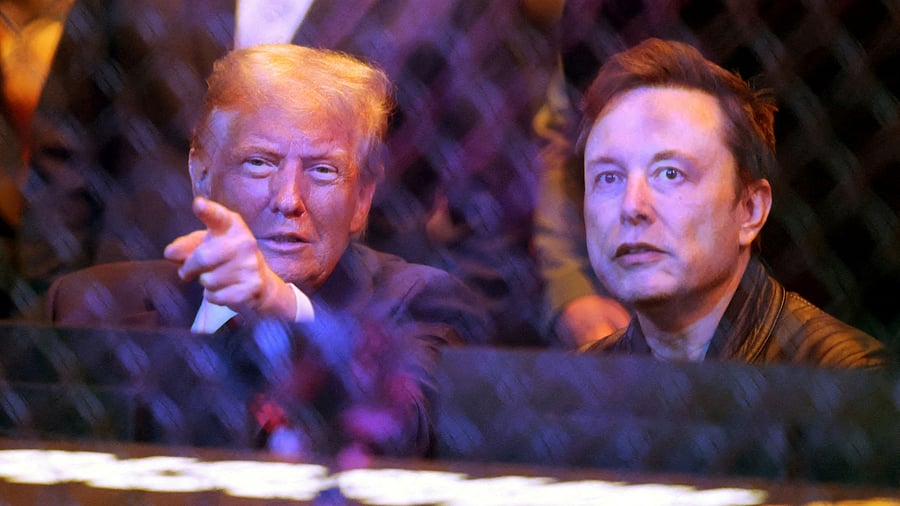
US President Donald Trump and Elon Musk.
Credit: Reuters Photo
In early July, Elon Musk, the South Africa-born American billionaire, launched the America Party, ostensibly to give Americans an alternative to the Democratic and Republican parties. At the launch, he stated that the objective of the new party was to “give you back your freedom.” Musk also announced that he hopes to support candidates for at least two to three Senate seats, and possibly as many as eight to ten in the House.
Quite predictably, his erstwhile friend, President Donald Trump - whose presidential campaign Musk had previously bankrolled to the tune of $250 million - reacted with some hostility, saying, “He can have fun with it, but I think it’s ridiculous.” Trump’s typical public bravado aside, he does have reason to be concerned. If Musk succeeds in getting several of his chosen candidates on the ballot, they could very possibly siphon off votes from the Republican camp.
Nevertheless, Musk’s new party faces significant legal obstacles as it seeks to support alternative candidates in both House and Senate races. To begin with, it must formally register with the Federal Election Commission. This process can be laborious and, to date, the party has yet to do so. Even after registration, it will have to get its candidates on the ballot in the states where it hopes to contest. This process is also cumbersome and varies from state to state. For example, in New York, the party may face an unexpected impediment: the state’s election laws prohibit the use of any part of the word “American” in the name of a political party.
Of course, it is entirely possible that Musk, with his vast wealth, will pursue a different strategy. He may simply create a political action committee (PAC) and support a range of candidates across the country who share his ideological preferences. These candidates, in turn, would run as independents. This may well be a viable pathway for Musk to field candidates of his liking. It is worth noting that, thanks to a Supreme Court ruling, a PAC can spend virtually unlimited sums in support of a candidate.
Even if he chooses this pathway, other obstacles remain. Campaigns require a vast army of paid personnel or volunteers to canvass for votes. Musk, with his untold riches, can certainly afford to pay a significant number of individuals to campaign. However, what his new party lacks is the deep-rooted political organisation that both the Democratic and Republican parties have at the grassroots level. This absence of local networks will undoubtedly hamper his efforts, regardless of how much money he spends.
Other factors could also hinder his plans to upend Trump and the Republicans. Musk is not known for his political acumen. His new party also appears to lack a defined ideological core, barring his avowed libertarianism. Consequently, it is far from clear that this lack of a coherent ideology will appeal to any significant swathe of voters. Some who are disillusioned with the policies of both Democrats and Republicans may choose to rally around his new party. However, at this juncture, it is simply too early to tell if these voters will amount to a groundswell.
Beyond this, Musk’s personality may also pose a problem. He is best known for his attitude of “moving fast and breaking things.” While such an outlook may work in the corporate world, many voters already reeling from the sweeping changes Trump has set in motion during his second term may not find this disruptive approach to politics particularly appealing.
Finally, the record of third parties and their candidates, especially in the latter half of the twentieth century, offers little hope for Musk. John Anderson, a former member of the US House of Representatives, ran for the presidency against Jimmy Carter and Ronald Reagan in 1980 but failed to make significant electoral progress. Ross Perot, a wealthy businessman, also ran as an independent candidate in 1992 with limited success. Similarly, social activist and lawyer Ralph Nader did not fare much better in the 2000 election that brought George W. Bush to power. All Nader managed was to siphon off a significant share of the popular vote from the Democratic candidate, Al Gore, in one or more crucial states.
In fairness, Musk is not running for the presidency nor can he, as his South African birth constitutionally prohibits him from doing so. Nevertheless, the track record of third parties abruptly entering the political fray is far from exemplary. Musk, with his inflated ego, immense personal wealth, and vaulting ambition, may believe that he can rally disaffected voters around his new party. However, the barriers to the success of this sudden endeavour, though not insuperable, remain high. Having made this commitment, he will likely devote significant resources to pursuing the cause. Yet, for all the sound and fury it may generate, his attempt to reshape the political landscape to his liking may well turn out to be an utterly quixotic quest. Challenging the dominance of two entrenched political parties with established organisational foundations and competing, even if fragmented, political visions may be too daunting a task.
(The writer is a Senior Fellow and Director of the Huntington Programme on Strengthening US-India Relations at the Hoover Institution, Stanford University.)